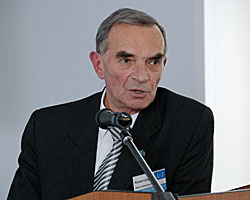Opinions & Interviews
Yakov Kenigsberg: Cancer morbidity rate is not related to the Chernobyl disaster

MINSK, 27 December (BelTA) – Cancer morbidity rate is in no way related to the accident at the Chernobyl nuclear power plant. The statement was made by Mr Yakov Kenigsberg, Head of the Radiation Safety Lab of the National Hygiene Research and Practice Center, representative of the Belarus government in the United Nations Scientific Committee on the Effects of Atomic Radiation, Chairman of the Radiation Protection Commission under the Council of Ministers of Belarus, BelTA has learned.
“The cancer morbidity risk in those, who were born in 1986, is just the same as that in all the other people,” said Yakov Kenigsberg.
The expert said that the dose of radiation that affected people back then was minuscule. “After the accident happened, the USSR Healthcare Ministry instituted the admissible radiation exposure norm for the population – 100mSv in the first year. The doze does not render a harmful impact on human body,” said the specialist.
According to Yakov Kenigsberg, the increase in the thyroid cancer morbidity rate among children and the underage is the most devious consequence of the Chernobyl catastrophe for the health of Belarusians. The expert believes that the morbidity rate in those, who were born after 1987, is just the same as that in the other people. “No proof of a noticeable increase in the morbidity rate of leukemia and other types of cancer after the Chernobyl disaster has been found. The same applies to non-cancer diseases,” remarked Yakov Kenigsberg.
He also underlined that one should not be afraid of radiation-polluted food being sold in shops. “Our country has introduced the world’s strictest standards. All the foods have to pass through multiple stages of control. Polluted food being sold in retail is out of the question,” said the expert.
In his words, wild-grown mushrooms and berries picked up by the population are most dangerous from this point of view. “As far as forests are concerned, we cannot apply the same protective measures we use in agriculture. We cannot plough it, apply special fertilizers, select the crops that will least accumulate radionuclides,” said the specialist. Getting people to understand that they cannot pick up mushrooms and berries in forbidden areas is the only way out, said Yakov Kenigsberg.
| Su | Mo | Tu | We | Th | Fr | Sa |
|---|---|---|---|---|---|---|







 print version
print version make home page
make home page add to bookmarks
add to bookmarks

